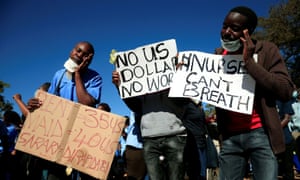
Rising transport costs have forced many nurses to walk to work.
“The reality … is that we are incapacitated from attending work even if we wanted to,” the Zimbabwe Nurses’ Association (ZINA), which represents around 15,000 state nurses, said in a statement,
Enock Dongo, a nurse in Harare and president of ZINA, said he could not afford to feed his family.
“If you look at how things have gone up in the shops, the basic commodities and rentals, surely you can not expect US$30 a month to cater for all that … We don’t have anything. I have subsidised the government for a long time but now I cannot do that anymore,” he told the Guardian.
In May, the finance minister wrote to the International Monetary Fund, warning that Zimbabwe faced a health and economic catastrophe.
Mnangagwa has blamed the economic malaise on unnamed “political detractors”. Officials have also repeatedly blamed restrictive measures including international sanctions for the country’s problems.
The government has been helped by a divided opposition that has failed to mobilise significant support, but has been undermined by a series of corruption scandals.
“What’s unusual about the expenditure [on luxury cars] is that it comes when the government is under siege financially. It looks like a desperate effort to scaffold their support. The real challenge for Mnangagwa is that the policy of patronage and plunder means significant reform is impossible,” said Piers Pigou, an analyst with the International Crisis Group.
Zimbabwe’s plight has revived memories of hardships more than a decade ago when hyperinflation wiped out savings and pensions and forced the country to dump its currency in favour of the US dollar.
According to the United Nations, an estimated 4.3 million rural Zimbabweans are currently in need of urgent assistance. Many in towns and cities are also threatened with malnutrition.
Gladys Mujima, 36, has a rare job as an accounting clerk at a popular retail chain but was forced to sell her car last month to supplement her family’s income after her salary was cut by 50%.
“I had no choice … but I don’t know how long that money will last us before we start looking for other assets to sell. Surely this is not what I hoped for three years ago when a new government came into power,” Mujima said.
Mavis Mapako, a mother of five from Hopley, a poor settlement near Harare, closed her small grocery store when Mnangagwa declared a nationwide lockdown in March. The 42-year-old now sells goods on the street.
“I don’t have anywhere … We are always harassed by soldiers and police. All I want is food for my family,” Mapako said.
As the economic situation has deteriorated, authorities have targeted opposition activists and lawyers.
An opposition parliamentarian and two party activists were abducted and then assaulted by unidentified men after protesting in May, according to the victims.
Police later arrested the three women, accusing them of faking their abduction and torture. They now face lengthy prison terms.
Eldred Masunungure, a political scientist at the University of Zimbabwe, said the situation “points to … a comprehensively volatile situation both politically and in the economy … The default position in the country is one of instability. It appears like the new normal.”
Clad in tattered blue overalls, Moffat Mureya spends his days rifling through the dumpsites of Kuwadzana township on the outskirts of Harare to find scrap metal to sell.
“I have encouraged my children to also start selling secondhand clothes, vegetables or anything they can just to keep the family going,” the 40-year-old said. “This is not the life I wanted for my family but I have to do it, or else we die of hunger.”
Post published in: Featured

